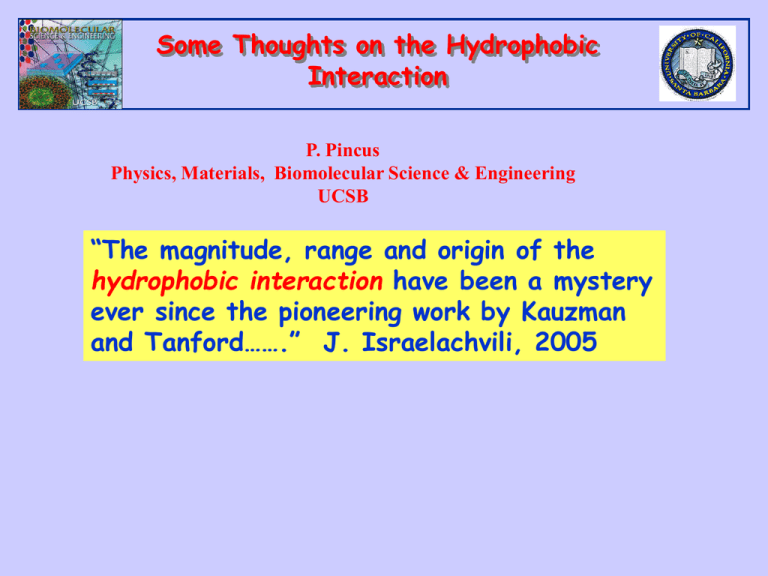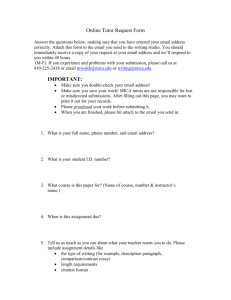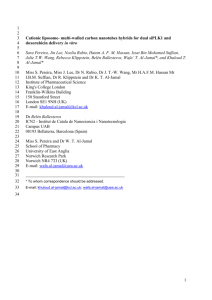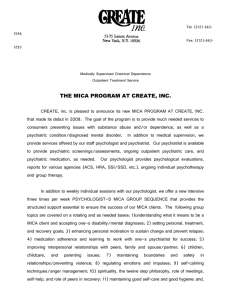Some Thoughts on the Hydrophobic Interaction have been a mystery
advertisement

Some Thoughts on the Hydrophobic Interaction P. Pincus Physics, Materials, Biomolecular Science & Engineering UCSB “The magnitude, range and origin of the hydrophobic interaction have been a mystery ever since the pioneering work by Kauzman and Tanford…….” J. Israelachvili, 2005 What is it? Strong short range (~ 1 nm) attractive force between hydrophobic surfaces in water (Tanford, Clausson, Wennerstrøm, F. Evans …….) Why oil is insoluble in water. ARE THESE UNRELATED? OUTLINE Interfaces – Patches E. Meyer, Q. Lin, J. Israelachvili (Israelachvili Group) A. Naydenov, P. Pincus Molecules – H-Bonding Network Disruption D. Hone, P. Pincus ISRAELACHVILI PROTOCOL • Surface force apparatus with mica substrate 100nm<h< 0.1nm Mica is highly Hydrophilic and Anionic – σ = 1e/nm2 Passivate with cationic surfactant DODAB – Langmuir Deposition Measure forces with SFA Look at surfaces with AFM AFM IMAGES Ch. Rotsch & Manfred Radmacher--LMU Patchy surface - nearly 50-50 mixture of bilayers and bare mica Broad distribution of patches– ten’s of nanometers UCSB AFM Air Hansma Lab Water Forces 0 4 0.01 0.1 -F/R (mN/m) -Force/Radius, -F/R (mN/m) Representative data for the normalized force vs distance curves for two DODA monolayer-coated mica surfaces (○) and for a DODA surface and a bare mica surface (●). 8 1 10 12 100 0 200 400 600 800 1000 D (Å) 0 Consistent with 1/r at short distances 200 400 600 800 Separation Distance, D (Å) 1000 DISJOINING PRESSURE Negative mobile holes Positive bilayer matrix L ~ nm-μm Coulombic correlation between positive and negative patches on opposing surfaces Bloomfield –Rouzina Attraction on L Scale Range scales with L~ 20 nm MONOLAYER INSTABILITY Gain in water/oil surface energy is sufficient to overcome screened Coulomb attraction. But why not complete segregation? Counterion Release HOMOGENEOUSLY CHARGED SURFACE Gauss’ Law φ => E 4e / Electrostatic Potential φ = T(x/λ) Gouy-Chapman Length λ = (4πσℓ)-1 Bjerrum Length ℓ = e2/εT ≈ 0.6 nm in water x All counterions bound to sheath of thickness λ ! ENTROPY DRIVEN PATCHES φ(X) Patch size given by balance of counterion release against line tension of patches. T(L/λ) L Broad patch distribution L~λ ln[(ζ/T)(csλ2)-1] ζ is line tension, cs is salt concentration X PASSIVATED MICA VS BARE MICA Experimental evidence for patch mobility! What is it? Strong short range (~ 1 nm) attractive force between hydrophobic surfaces in water (Tanford, Clausson, Wennerstrøm, F. Evans …….) Why oil is insoluble in water. ARE THESE UNRELATED? H-BONDING IN WATER V Polarizability of O-- t U > V SP hybridization U 2 H 2O OH H 3O hydroxyl 1014 ions/cm3 => U~20 kBT H-bond energy ~ -t2/(2U) ~ 5 kBT hydronium MOLECULAR HYDROPHOBIC INTERACTTION Disruption of H-bonding network Chandler et al Non-H bonding impurity --- alkyl chain Cost in H bonding energy = zt2/U Z is coordination number Nearest neighbor impurities gain t2/U ~ 5 T!!! TAKE-HOME MESSAGE Electrostatic coupling between charged domains in proteins and other biopolymer, membrane systems Patches stabilized by counterion release Hydrogen bond network disruption in molecular systems No unique “hydrophobic interaction”….



